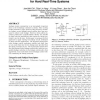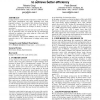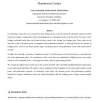26 search results - page 2 / 6 » Cache-Line Decay: A Mechanism to Reduce Cache Leakage Power |
CASES
2007
ACM
13 years 8 months ago
2007
ACM
Leakage energy consumption is an increasingly important issue as the technology continues to shrink. Since on-chip caches constitute a major portion of the processor's transi...
SAC
2008
ACM
13 years 4 months ago
2008
ACM
Leakage power in cache memories represents a sizable fraction of total power consumption, and many techniques have been proposed to reduce it. As a matter of fact, during a fixed ...
CF
2005
ACM
13 years 6 months ago
2005
ACM
As technology scales down at an exponential rate, leakage power is fast becoming the dominant component of the total power budget. A large share of the total leakage power is diss...
HIPEAC
2007
Springer
13 years 11 months ago
2007
Springer
Voltage scaling reduces leakage power for cache lines unlikely to be referenced soon. Partitioning reduces dynamic power via smaller, specialized structures. We combine approaches,...
IPPS
2007
IEEE
13 years 11 months ago
2007
IEEE
As process technology advances toward deep submicron (below 90nm), static power becomes a new challenge to address for energy-efficient high performance processors, especially for...



